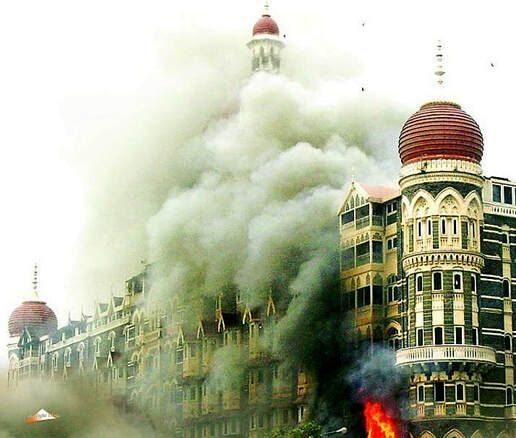HOTEL MUMBAI
*****
Director: Anthony Maras
Screenwriters: Anthony Maras and John Collee
Principal cast:
Dev Patel
Anupam Kher
Armie Hammer
Nazanin Boniadi
Tilda Cobham-Hervey
Jason Isaacs
Amandeep Singh
Country: Australia/USA/India
Classification: MA15+
Runtime: 125 mins.
Australian release date: 14 March 2019
Previewed at: Dendy Newtown, Sydney, on 6 March 2019.
Hotel Mumbai is a nerve-racking account of the multiple terrorist attacks which took place in Mumbai in November 2008, commencing in the main railway station and then moving to 10 other sites across the city before focusing on the world-famous Taj Mahal Palace Hotel. From a mass of raw material, including testimonies from witnesses, survivors and the sole attacker to be tried, plus court transcripts and recordings of the terrorists’ phone communications with their handlers in Pakistan, and drawing on the 2009 ABC-TV documentary Surviving Mumbai, it has been skilfully transmuted into script form by first-time director Anthony Maras and seasoned writer John Collee. It was, by all accounts, an utterly terrifying ordeal and the resulting film has been described in The Hollywood Reporter as being ‘…as close to reality as a movie can be’, which is a pretty fair assessment of the two writers’ work. It is very, very tense.
The 10 Pakistani attackers entered Mumbai in an inflatable boat through a fishing village in Colaba in the south of the city and then travelled in taxis to their assigned targets. As panic spread throughout the streets, four of the terrorists entered the Taj among a group of terrified citizens and tourists seeking shelter, and proceeded to open fire indiscriminately using high-powered AK-47 automatic weapons. All the while, they had direct contact with their leader (referred to only as ‘The Bull’) by using VoIP phones, which enabled them to both receive explicit instructions and be constantly reassured that their murderous actions would guarantee them a place in paradise. If you’ve ever had the pleasure of visiting this very special landmark, you will know how magnificent and almost surreal it is - a palace of peace surrounded by the mayhem of a vast, chaotic city, the hotel offers sanctuary for the privileged few and this presumably is why it was singled out by the terrorists, whose ultimate aim was to burn down this symbol of wealth and prestige. They knew that targeting such a place would ensure that their message would reverberate around the world and it is this location, too, on which the filmmakers have focused.
In Hotel Mumbai Collee and Maras have followed a few specific characters, some based on actual people and some composites of a few, to illustrate the bigger picture: a Sikh waiter, Arjun (Dev Patel), who plays a vital, heroic role and represents the slum-dwelling employees of the hotel; Head Chef Hemant Oberoi (Anupam Kher), who lives by, and is prepared to die for, his motto of “Guest Is God”; a wealthy, interracial married couple, David and Zahra, played by Armie Hammer and Nazanin Boniadi, and their Australian nanny Sally (Tilda Cobham-Hervey); an obnoxious Russian businessman, Vasili (Jason Isaacs); one of the terrorists, Ajmal (Kapil Kumar Netra), wounded in a shootout; plus a number of more peripheral individuals. Their stories and situations combine to reveal a gripping, multi-layered plot.
Filmed half in India and half in Adelaide, the movie is superbly shot by Nick Remy Matthews, who puts us in the thick of the drama, often shooting in cramped spaces and peering around corners or through cracks in doors and windows, and this footage is tightly edited by Peter McNulty. Volker Bertelmann’s score is never intrusive but constantly and subtly supplements the action on screen and veteran production designer Steven Jones-Evans has seamlessly combined the look of the Indian and Australian locations. Director Anthony Maras has done an excellent job in drawing all these elements together for his feature film debut; a background studying law and history seems to have served him particularly well for this subject - that phone you can hear is Hollywood calling. On top of this are the outstanding performances of the actors; they are all first-rate, right down to the small but important supporting roles, because collectively they add texture and detail to the overall picture of terror and bravery. Patel, though, deserves to be singled out. Well-known to audiences from Slumdog Millionaire, The Best Exotic Marigold Hotel films and Lion, he excels himself in Hotel Mumbai as a man who is way out of his depth but rises to the occasion of these exceptional circumstances.
This is an important film that will have you glued to your seat; important because, as well as depicting the horrific events, in its understated way Hotel Mumbai attempts to grapple with the rationale that led to them. The young terrorists don’t have much to say but what they do say is revealing. These were uneducated, impoverished country dwellers, thoroughly brainwashed by the evil minds behind the planning, who were led to believe that their families would benefit financially from the atrocity. While not sympathetic to them in any way, it does show that these kinds of actions aren’t solely attributable to religion. The film is also a powerful testament to the astonishing heroism of ordinary people placed in extraordinary situations.
